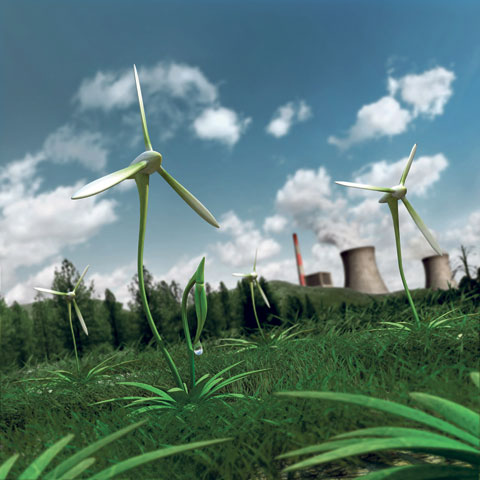In 2008 a new tradition started at the TU Delft: the Sustainability Event. Sustainability becomes a more and more important theme at the university. Therefore, a group of students wanted to organize a big yearly event to let all students know which sustainable projects are going on in Delft.
Sustainability is very trendy and booming. To show this, sustainability platform Osiris and the Students 4 Sustainability (S4S) foundation presented an event during a week in November 2008 with an exhibition about sustainable project in de TU aula and several workshops, lectures and excursions about sustainable subjects. To continue with this new ‘tradition’ the Sustainability Event ’09 (9-14 November) is being organized at this moment. More organizations joined the organizational team this year. Besides Osiris and S4S, also the Energy Club will do everything to organize a great Sustainability Event ’09! It is time to get to know these organizations better.
Osiris
Osiris is an interactive student platform that wants to make sustainable development touchable and attractive by combining theory and practice. The goal is “to increase the social basis of sustainable development at the university by facilitating exchange of knowledge and information, and creating and maintaining a network”, according to Niek Stukje, chairman of Osiris.
Osiris publishes the Osiris Magazine in which all news, facts and comments about sustainable projects at the TU Delft can be found. “We want to make sustainability in Delft more visible and accessible for students and let them know that sustainable development is enjoyable and challenging. Together we can make big steps forward to a more sustainable university and a more sustainable world.”
Do you want to share something with students, teachers, professionals and other enthusiastic people about sustainability? It is possible on the Osiris website! Register yourself as ‘networker’ on www.osiris.tudelft.nl.
Students 4 Sustainability
Foundation Students 4 Sustainability (S4S) is created by three TU students in the last lustrum year of the university (2007). The aim of S4S is to apply sustainable, technical solutions from students to problems in developing countries. Keywords are ‘People, Planet and Profit’. In many cases, students develop good sustainable solutions to big problems, but due to the lack of financing, it is not possible to implement these solutions in these relatively poor countries.
“We want to be the link between the student’s solution and the implementation of it! We think the people will benefit from implementation of these good, sustainable solutions that students find to some of the big problems around health or energy supply. We support several enthusiastic student teams with their sustainable projects in a developing country”, according to Wouter Boessenkool, chairman of S4S. Besides financial support, S4S wants to let students know what they can do with all their knowledge and motivate them to use this knowledge for good ends in a sustainable way.
For more information about S4S and the projects they support, go to the website www.students4sustainability.nl and sign yourself up as a contributor for only 2 Euros per month!
Energy Club
The Energy Club is the gathering place for people involved in energy and aims to bring students closer to energy related topics at the TU Delft. It is a place where students, professors, teachers, employees, companies and alumni come together and share information, inspiration and motivation. A network and a platform from which many activities, projects and other spin-offs can start.
Although the Energy Club is still in a start-up phase, the very first ventures have already been successful. “We have brought together a student team working on an innovative wind energy project and we’ve mobilized some thirty students from TU Delft and other universities, participating in a national sustainable electricity congress. This is the essence of the Energy Club: mobilizing people for inspiring energy initiatives”, according to Remco Addink, chairman of the Energy Club.
The Energy Club is part of the Delft Energy Initiative. As part of this, they are also involved in the Energy on the Campus initiative, mobilizing students to make our campus more sustainable and energy efficient.
If you are interested in what the Energy Club is going to be, make sure to come to the opening event on 09-09-09!
De Delftse rakettenbouwvereniging DARE (Delft Aerospace Rocket Engineering, 80 leden) testte twee verschillende typen motoren: twee zogenaamde boosters en een hoofdmotor, sustainer genoemd.
Voor de test worden de buisvormige motoren verticaal aan een paal bevestigd die op zijn beurt stevig in de grond verankerd is. Tijdens de ontbranding meet een sensor de stuwkracht van de raket.
‘Op naar Kiruna’, klonk het na de laatste test. Daar op de Noord-Zweedse lanceerplaats Esrange zal eind januari de lancering plaatsvinden van de vier meter lange geassembleerde STRATOS-raket. De precieze dag hangt af van het weer. Een set van vier boosters van ongeveer een meter lang vormt de eerste trap van de STRATOS-raket. Ze branden slechts 3,5 seconden en moeten de raket op de rand van de geluidssnelheid brengen.
Na het afwerpen van de eerste trap is het de beurt aan de bijna twee meter lange en 19 kilo wegende hoofdmotor van koolstofvezel die in een kleine 6 seconden tijd de raket tot 3500 meter per seconde zal versnellen. Dat moet voldoende zijn om een hoogte van vijftien kilometer te bereiken, schatten de studenten. Het huidige record voor zelfbouwraketten staat op 10,6 kilometer.
Ontwerper Mark Uitendaal (masterstudent Luchtvaart- en Ruimtevaarttechniek) toonde zich bijzonder tevreden over de tests. Andere leden feliciteerden hem uitgebreid.
Meer info: dare.tudelft.nl



Comments are closed.